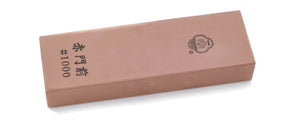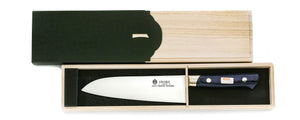Washing Your Knives
As knives are used to cut food, it's natural to expect that food bacteria might transfer to the knife itself. We see some of it with our eyes, but of course sometimes we aren't able to when it's tiny particles. Leaving a knife like this, especially a premium one, is a bad idea. Not only is it hygienically an issue, it's unsafe to put food cut with it into your mouth if used repeatedly without cleaning. It can even cause damage to the knife if you aren't careful.
It's absolutely necessary to wash your knives frequently to keep them (and in turn your stomach) in good condition. However, there's certain tips that make washing a knife not only easier, but better for your knife health! This blog goes into just that. So let's get to cleaning!
After using the knife
Once you've finished using your knife, have a sponge and a neutral detergent prepared for cleaning. If there's oil on the knife, or you've cut ingredients that have oil in them - make sure to thoroughly soak the sponge in a neutral detergent before washing.
When washing the knife, make sure to pinch it from the back (or "top".) Washing from the blade side can cause your sponge to tear, or you might even cut your hand. Remember, knives are sharp so please be careful!
After washing, rinse your knife thoroughly with water then wipe it completely dry with a towel. Make sure to wipe it as dry as possible - water when combined with air (moisture) can cause your knife to rust - even stainless steel ones if left for a long time.
Try washing with warm water - it's easier to dry compared to cold water!
Is it safe to wash and dry knives in the dishwasher?
We often get asked if knives can be safely washed or dried in the dishwasher. Simply put, it's not recommended (bar some specific products.) Let's go into detail as to why:
The knives may rust
Unlike handwashing where you can use a neutral detergent, dishwashers often use detergents that are very strong in alkaline or acidic properties. This is to assist with thoroughly cleaning off grease and other oil or food stains you may get on kitchenware. However, this can cause certain steels to rust - even stainless steels. Despite their resistance, over time if constantly washed in a dishwasher you may see rust start to appear. This is especially true for carbon steel knives like White Steel, so absolutely make sure to wash those by hand.
The knife's handle may get damaged
Many Japanese knives, and even some Western knives these days have a natural wooden handle affixed to them.
Normally, dishwashers work at incredibly high temperatures then dry off the products inside. As said earlier, the detergent used is generally much stronger compared to handwashing detergent as well.
Wood is incredibly susceptible to these rapid temperature changes, and can deteriorate very quickly as a result.
Infact, many of our customers who come to us needing knife repair have needed it because they put their knife through the dishwasher and the handle has become damaged. If a handle gets damaged, it must be replaced quickly to prevent other damage to the knife such as rust inside the handle or tang itself.
The knife's blade could chip
When people use their dishwashers, it's uncommon for them to be washing just knives. Pots, pans, plates and more will likely be in there during the operational cycle.
As dishwashers wash items using lots of force, there's a chance your knives will come into contact with other items in the dishwasher (including other knives) which may cause chipping. With knives that are a higher hardness, this is especially likely. Most Japanese kitchen knives are fairly hard, so this is a large concern. This is also a reminder to make sure to load your dishwashers carefully to prevent damage to other items in general.
Keep your kitchen (and knife) clean at all times
If you keep up with your kitchen cleaning regiment, and clean your knives by hand - you don't have very much to worry about. Again, make sure they are completely dry.
This has the benefit of making sure your knife stays hygenically sound, and rust free. Plus, a clean kitchen is a pretty kitchen! Remember, kitchen knives are used to cut food. You don't want unhygenic food in your mouth after all, so it's better to clean your tools thoroughly, no matter what they are. A dirty knife can rust too, so wash and clean them the moment you're finished with them.
While we understand that cleaning by hand does take more time, this will give your knife a much longer lifespan. Our knives are designed to be generational knives - handed down or onto others. Keeping them clean - and in the right way, will make sure that your knife lasts for a lifetime.
If you've washed your knife and cleaned it thoroughly, then you have no need to worry or be nervous about them rusting! You can also oil your knives after cleaning them to make sure they stay even more rust-free.
If you have questions, or need recommendations for certain detergents or sponges - feel free to reach out to use directly and we can help!
A clean knife is a good knife!































